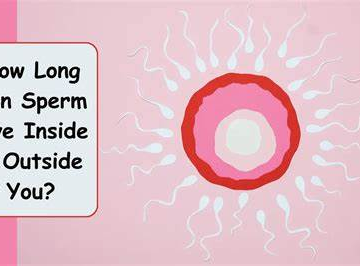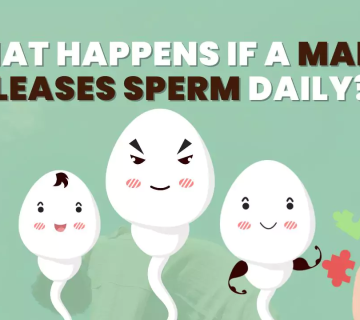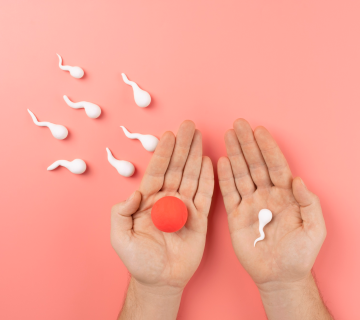
How Long Does Sperm Live in Condoms?
When it comes to safe sex, condoms are a go-to choice for millions of people. They’re affordable, easy to use, and super effective at preventing pregnancy and STDs. But have you ever wondered what happens to the sperm once it’s trapped inside a condom? How long does it stay alive? Can it still cause pregnancy if something goes wrong? These are questions lots of folks have, and they deserve clear, helpful answers.
In this article, we’re diving deep into everything you need to know about how long sperm lives in condoms. We’ll break it down with science, practical tips, and even some fresh info you won’t find everywhere else. Whether you’re curious about condom safety, worried about accidents, or just want to know more about how sperm works, we’ve got you covered. Let’s get started!
What Happens to Sperm Inside a Condom?
When you use a condom during sex, it catches the semen (the fluid that contains sperm) and keeps it from entering the vagina. Pretty straightforward, right? But what happens to those little swimmers after they’re trapped in there?
The Basics of Sperm Survival
Sperm are tough little cells designed to survive long enough to reach an egg. Inside the body—like in a woman’s reproductive tract—they can live for up to 5-7 days under the right conditions. But outside the body, or in a condom, things change fast. The environment inside a condom isn’t exactly a spa day for sperm—it’s dry, lacks nutrients, and isn’t the cozy temperature they love.
Why Condoms Are a Sperm Trap
Condoms are made of materials like latex or polyurethane, which don’t let sperm escape. Once ejaculation happens, the sperm are stuck inside that little pouch at the tip (or wherever the semen collects). Without moisture, warmth, or food (like the sugars in semen get used up quick), they start to lose their mojo.
Quick Answer: How Long?
Here’s the short version: Sperm can survive inside a condom for a few hours—usually up to 2-3 hours max—before they die off. But that’s not the whole story. Let’s dig deeper into why that happens and what it means for you.
The Science Behind Sperm Lifespan in Condoms
Sperm might seem unstoppable, but they’re actually pretty fragile outside their natural habitat. Let’s look at the science to see what keeps them alive (or kills them) inside a condom.
Key Factors Affecting Sperm Survival
Sperm need three big things to stay alive: moisture, warmth, and nutrients. Inside a condom, these get messed up fast:
-
- Moisture: Semen starts to dry out once it’s exposed to air, even inside a condom. Without liquid, sperm can’t swim or survive.
-
- Warmth: Sperm like it around 98°F (body temp). A condom sitting on the nightstand cools down quick, stressing them out.
-
- Nutrients: Semen has sugars that feed sperm, but that supply runs out in a closed-off space like a condom.
Research Says…
Studies show that sperm outside the body—like on skin or in a condom—lose their ability to move (that’s called motility) within minutes to hours. One study from the Healthy Male organization found that sperm in a condom can stay alive for a few hours tops, but they’re not in fighting shape for long. After about 20-30 minutes, most stop moving, and by 2-3 hours, they’re pretty much done.
Expert Insight
“Sperm are resilient, but they’re not superheroes,” says Orion Nightingale, a reproductive health researcher. “Once they’re in a condom, the clock starts ticking fast. Without the right conditions, they’re toast in a couple of hours.”
Does Condom Type Make a Difference?
Not all condoms are the same. You’ve got latex, non-latex, spermicidal, flavored—does the type change how long sperm lasts? Let’s break it down.
Latex vs. Non-Latex Condoms
-
- Latex: The classic choice. It’s strong and doesn’t let sperm leak. Survival time? Same deal—2-3 hours.
-
- Non-Latex (like polyurethane or polyisoprene): These work just as well at trapping sperm. No big difference here either.
Spermicidal Condoms
Some condoms come coated with a chemical called nonoxynol-9, which is supposed to kill sperm. Sounds like it’d shorten their life, right? Well, kinda. Research shows spermicides mess with sperm’s ability to swim almost instantly, but they don’t kill all of them right away. Inside a spermicidal condom, most sperm are dead or useless within an hour—faster than regular condoms.
Flavored or Warming Condoms
These are fun for oral sex or extra sensation, but they don’t change sperm lifespan much. The flavoring or warming lube doesn’t really affect the sperm unless it’s spermicidal too.
Takeaway
No matter the condom, sperm don’t hang around long. Spermicidal ones might speed up the end, but we’re still talking hours, not days.
Can Sperm Escape a Condom and Cause Pregnancy?
This is the big worry: What if the condom breaks or you mess up taking it off? Can those sperm still get you pregnant? Let’s talk risks and realities.
Condom Breaks or Tears
If a condom splits during sex, sperm can spill out and head straight for the vagina. If that happens, they can live in the woman’s body for up to 5-7 days, waiting for an egg. That’s why emergency contraception (like the morning-after pill) is key if you’re not trying to get pregnant.
Slip-Ups After Sex
Ever heard the tip to “pull out before you soften”? There’s truth to that. If you keep the condom on too long after ejaculation, it might slip off, and semen could leak. Even a tiny drop near the vaginal opening could be trouble—sperm are small but determined.
Myth Buster: Sperm Can’t Swim Through Condoms
Here’s a fun fact: Some people think sperm are so tiny they can wiggle through a condom’s material. Nope! Condoms are tested to block even the smallest particles (like viruses), so sperm—way bigger—don’t stand a chance.
Real-Life Example
Imagine this: Jake and Mia use a condom, but it tears during sex. They don’t notice until after. Now, sperm are loose in Mia’s body, and she’s ovulating soon. Pregnancy risk? High. A quick trip for Plan B could save the day.
How Long Does Sperm Live in a Used Condom Lying Around?
Okay, so you’ve used the condom, tied it off, and tossed it on the floor (or trash—please trash it!). How long are those sperm kicking?
Drying Out Fast
Once semen dries, sperm are toast. In a tied-off condom, it might take a couple hours for the semen to dry out completely, depending on the room’s temp and humidity. After that, no live sperm.
Room Temperature Reality
At room temp (around 70°F), sperm lose motility fast—think 20-60 minutes. By 2-3 hours, they’re goners. If it’s super hot or cold, they die even quicker.
Practical Tip
Don’t stress about a used condom sitting in the trash for hours. The sperm inside aren’t sneaking out to cause chaos—they’re long gone by morning.
Comparing Sperm Lifespan: Condoms vs. Other Places
To really get how condoms affect sperm, let’s compare it to other spots sperm might end up.
| Environment | How Long Sperm Live | Why? |
|---|---|---|
| Inside a Condom | 2-3 hours max | Dries out, cools down, no nutrients |
| On Skin | A few minutes | Dries super fast, no moisture |
| In Water (like a tub) | Seconds to minutes | Chemicals or heat kill them quick |
| In the Vagina | Up to 5-7 days | Warm, wet, perfect for sperm |
Why Condoms Are Safer
See the difference? Condoms cut sperm’s life way shorter than the body does. That’s why they’re so good at preventing pregnancy—sperm don’t get a chance to hang out and wait.
Latest Research: What’s New in 2025?
Science keeps moving, and 2025 has some cool updates on sperm and condoms. Here’s what’s fresh and how it ties in.
Sperm Viability Studies
A recent study from March 2025 (yeah, this year!) looked at how long sperm stay viable in different settings. They found that even in a condom with spermicide, a tiny fraction might twitch for up to 4 hours—but they’re too weak to fertilize anything. That’s new info showing spermicides don’t zap them instantly but do make them useless fast.
Condom Tech Advances
Researchers are testing condoms with built-in “sperm traps”—tiny coatings that immobilize sperm on contact. Early results say these could drop survival time to under an hour. Not in stores yet, but maybe soon!
Expert Take
“Sperm are stubborn, but modern condoms are outsmarting them,” says Ophelia Caspian Sterling, a fertility expert. “New designs could make slip-ups even less risky.”
Practical Tips: Using Condoms to Keep Sperm in Check
Knowing how long sperm live is cool, but let’s make it useful. Here’s how to use condoms right and avoid surprises.
✔️ Do This
-
- Check the Date: Expired condoms can tear. Look at the wrapper—don’t use it past that date.
-
- Size Matters: Too tight or loose? It might break or slip. Find your fit (most brands have size guides).
-
- Pull Out Smart: After ejaculation, hold the base and pull out before you go soft.
-
- Tie It Off: Knot the condom after use so nothing spills, then toss it.
❌ Don’t Do This
-
- Reuse Condoms: Nope, never. One and done.
-
- Leave It Lying Around: Don’t let a used condom sit near your partner—spills happen.
-
- Skip the Lube: Dry condoms tear more. Use water-based lube (not oil—it breaks latex).
Step-by-Step: Safe Condom Removal
-
- Finish up, then hold the condom’s base with one hand.
-
- Pull out while it’s still firm—don’t wait.
-
- Slide it off gently, keeping semen inside.
-
- Tie a knot at the open end.
-
- Wrap it in tissue and trash it—no flushing!
What If Something Goes Wrong?
Accidents happen—condoms break, slip, or get used wrong. What now?
Emergency Options
-
- Plan B: Get it within 72 hours (sooner is better) if semen might’ve escaped. It’s over-the-counter at most pharmacies.
-
- Copper IUD: A doctor can insert this up to 5 days after for emergency contraception. Bonus: it’s long-term birth control too.
Signs to Watch For
Worried about a leak? If you notice wetness outside the condom or it’s torn, act fast. Pregnancy tests work about 10-14 days later if you’re unsure.
Real Talk
“I’ve seen couples panic over a broken condom, but quick action saves the day,” says Caspian Sterling. “Don’t wait—grab emergency contraception and breathe easier.”
Busting Myths About Sperm and Condoms
There’s tons of weird info out there. Let’s clear up some big myths with facts.
Myth #1: Sperm Live for Days in a Condom
Nope! Hours, not days. They dry out and die fast outside the body.
Myth #2: You Can Reuse a Condom If It’s Quick
Big no. Even if sperm are dead, the condom’s stretched and weak—plus, it’s gross.
Myth #3: Freezing a Used Condom Keeps Sperm Alive
Not really. Freezing semen for fertility (like in sperm banks) needs special chemicals and gear. A condom in your freezer? Dead sperm city.
Why This Matters for You
Understanding how long sperm live in condoms isn’t just trivia—it’s power. It helps you:
-
- Feel confident using condoms right.
-
- Know what to do if something fails.
-
- Bust myths and avoid worry.
Condoms are 98% effective when used perfectly (and 85% in real life with slip-ups). Keeping sperm trapped and short-lived is how they work their magic.
Let’s Talk: Your Questions Answered
Got more on your mind? Here are some common Qs we hear:
Q: Can sperm leak out if I don’t tie the condom?
A: Yup, if it tips over or spills, semen could escape. Tie it to be safe.
Q: Does double-condoming make sperm die faster?
A: No, but it makes condoms more likely to tear from friction. Stick to one.
Q: What if I’m allergic to spermicide?
A: Skip spermicidal condoms—regular ones work fine and still keep sperm contained.
Wrapping It Up: Sperm, Condoms, and You
So, how long does sperm live in condoms? About 2-3 hours, tops—less if it’s spermicidal or dries out fast. They’re trapped, they die quick, and that’s why condoms are awesome at preventing pregnancy. With the right moves (proper use, quick removal, smart disposal), you’re golden. Even if something goes wrong, you’ve got backup plans.
This isn’t just about facts—it’s about peace of mind. Next time you grab a condom, you’ll know exactly what’s up with those sperm. Got a story or question? Drop it below—we’d love to hear from you! What’s your go-to condom tip? Let’s chat!
Interactive Fun: What Do You Think?
-
- Poll: How long did you think sperm lived in a condom before reading this? (A) Days, (B) Hours, (C) Minutes—comment your guess!
-
- Challenge: Try tying a knot in an old sock (practice for condom skills—no mess required). How fast can you do it?
- Share: Ever had a condom mishap? Spill the tea (anonymously if you want) in the comments!



